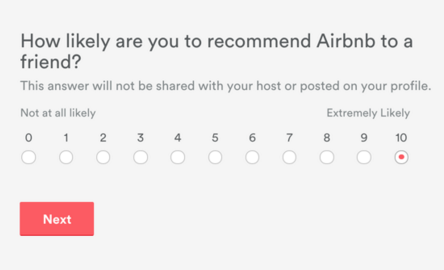Vanity Metrics — Why the Net Promoter Score (NPS) will not help you to improve your workplace, company or product.

In the last decade, the Net Promoter Score (NPS) has become so ubiquitous, it is hard to escape. It is being used to ask about our experience in regards to anything from apps all the way to hospitals stays.
Companies use it to both understand the satisfaction of their customers as well as their employees.
At the most basic level, the Net Promoter Score is a process for gauging customer satisfaction and gathering feedback.
It is a single question and sometimes with a follow-up question attached.
The NPS is, in its creator’s words at least, “the one number you need to grow. It’s that simple and that profound.”
The following will argue that NPS is simplistic, rather than simple and only marginally profound.
The Net Promoter Score

Commonly NPS questions are framed as:
How likely is it that you would recommend our company/product/service to a friend or colleague?
The scoring for this answer is most often based on a 0 to 10 scale.
Sometimes this is being followed up with something like: “What could get this up to a 10” or “Why did you choose this number?
What’s good about it
Net Promoter Score (NPS) meets all the common requirements of a “useful” business metric:
- It’s easy to measure.
- It produces a number you can track, benchmark and compare.
- It feels legitimate and reliable — almost objective.
Most importantly: it gives a basic view on where a company stand in regards to customer or employee satisfaction.
So NPS might be a good tool for focusing a companies attention on customer loyalty — It can drive initial culture change towards more customer and employee centricity.
Simple vs. Simplistic
As good as that sounds at first glance some questions and challenges come to mind:
- Emotions on a scale. The premise of rating human experience and emotion on a numerical scale is profoundly odd. Where else in our lives do we encounter this? Person A: “Hi! Good to see you! How are you doing?” Person B: “7.”
- It’s a weird question. Why ask people a question that they’re not used to being asked? Why ask someone if they’ll do something, when you could be asking if they liked your product, or what they’d improve?
- We don’t act as we say. NPS captures attitude (what you say you will do) rather than behaviour (what you do). The thing is that we humans are famously bad at predicting our own behaviour, as anyone who ever made a New Years resolution will attest to.
- It’s inconsistent. There is inconsistency between how the questions is framed and how people will answer. Asking if someone is going to recommend something is asking about overall opinion of and relationship with a company or product. But the response is much more likely to be biased by one’s most recent experience. So why not ask about the experience directly?
- Its a vanity metric. NPS is easy to measure and compare, but it’s not actually a proven indicator of business growth. The founder himself admits that his original research was flawed, and that he never found evidence that high NPS scores are causally related to company growth.
- The value is in the “Why”. NPS believers will say that a good implementation of NPS follows up with a qualitative question, asking why? And they are right! The real value is the “Why” answer. The customer or employee tells you what happened, and how you could improve. The follow up question is where the value is. So why keep the rating question?
- False sense of security. Say a company has a high NPS score— what does it really tell? That all is jolly and it’s OK to stop improving and innovating? Happy users of MySpace would have recommended it to the moon — until, of course, Facebook came along.
“The business impact of increasing NPS scores may be less than what we would estimate from a naive analysis.” Airbnb on NPS

Human experience is more than a number
This is the biggest flaw of NPS. It tries to achieve an outcome that can’t be achieved. Boiling human experience down to a single number is tempting, but it promises to solve a problem that can’t be solved so simply.
The experience of working somewhere day in and day out can not be put into one simple number. Neither can the experience of receiving medical attention in a hospital for an extended period of time.
It’s just more complex then that.
The simplicity of NPS can be deceiving and will always come at cost of richness and insight.
People who believe in NPS can tell us about human experience are believing it can do something it actually can not.
So what’s the alternative?
When designers do customer interviews, they rarely to ask how likely they are to recommend to a friend. Far more common questions are:
“How do you feel about the product?”
“What would you improve about the product?”
“What did you expect to see in the product?
“What do you find challenging, and why?”
Answers to these kinds of questions are harder to put into a number but they offer far more insight and are a better starting point for improvements.
If it is the true goal of a company to really understand what works and what doesn’t , both for employees as well as customers, then there are better ways to do that than NPS.
But building up this better and not simplified understanding, of course, comes at a cost: We will need resist the urge to boil it down to a number and embrace complexity.
One last thing: How likely are you to recommend this article to your friends or colleagues? 😉
Sebastian Nause-Blueml, Co-founder at www.scoutbase.com, [email protected]
scoutbase.com | Monthly newsletter | Twitter | LinkedIn
Vanity Metrics — Why the Net Promoter Score (NPS) will not help you to improve your workplace… was originally published in Scoutbase — Realtime Leading Safety Indicators on Medium, where people are continuing the conversation by highlighting and responding to this story.